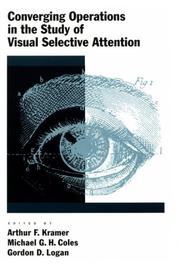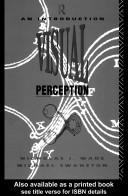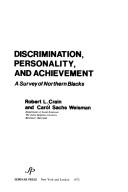| Listing 1 - 7 of 7 |
Sort by
|
Book
ISBN: 9780553804645 9780440423294 Year: 2013 Publisher: New York, N.Y. Delacorte Press
Abstract | Keywords | Export | Availability | Bookmark
 Loading...
Loading...Choose an application
- Reference Manager
- EndNote
- RefWorks (Direct export to RefWorks)
The authors explore the hidden biases we all carry from a lifetime of exposure to cultural attitudes about age, gender, race, ethnicity, religion, social class, sexuality, disability status, and nationality. 'Blindspot' is the authors' metaphor for the portion of the mind that houses hidden biases. They question the extent to which our perceptions of social groups - without our awareness or conscious control - shape our likes and dislikes and our judgments about people's character, abilities, and potential. The title's 'good people' are those of us who strive to align our behaviour with our intentions. The aim of this book is to explain the science in plain enough language to help well-intentioned people achieve that alignment. By gaining awareness, we can adapt beliefs and behavior and 'outsmart the machine' in our heads so we can be fairer to those around us. Venturing into this book is an invitation to understand our own minds.
PREJUDICES --- DISCRIMINATION--PSYCHOLOGICAL ASPECTS --- Social psychology
Book
ISBN: 143380929X Year: 2011 Publisher: Washington, District of Columbia : American Psychological Association,
Abstract | Keywords | Export | Availability | Bookmark
 Loading...
Loading...Choose an application
- Reference Manager
- EndNote
- RefWorks (Direct export to RefWorks)
"In the present volume, we focus beyond the goal of reducing prejudice to explore what other factors might be necessary to improve relations between groups. This book brings together original contributions from leading scholars in social psychology who have begun to examine the motivations and processes that underlie people's ability to develop positive and meaningful relationships across group boundaries. The present volume compels us to move beyond our field's traditional focus on prejudice reduction, to consider novel approaches to studying intergroup attitudes and strategies that we can use to improve relations between groups"--Introduction. (PsycINFO Database Record (c) 2010 APA, all rights reserved).
Prejudices. --- Discrimination. --- Intergroup relations. --- Prejudice --- Discrimination, Psychological
Book
ISBN: 9782356443984 2356443983 Year: 2020 Publisher: Paris: Enrick B,
Abstract | Keywords | Export | Availability | Bookmark
 Loading...
Loading...Choose an application
- Reference Manager
- EndNote
- RefWorks (Direct export to RefWorks)
Quatrième de couverture : "Nous vivons dans un monde rempli de préjugés. Et cela ne doit rien au hasard. Notre cerveau, fabuleuse machine à appréhender le monde, fabrique sans cesse des stéréotypes et fait de nous, que nous le voulions ou non, de parfaits discriminateurs. Mais, ne vous en faites pas car nous allons vous expliquer pourquoi ce processus est parfaitement normal et comment en limiter les effets néfastes. Dans son livre, Enrick Barbillon, psychosociologue, nous dévoile les tours que nous joue notre cerveau, les stéréotypes inconscients ou non qui nous guident et leurs conséquences à l’échelle de la société. « C’est un fait qu’il faut accepter : notre cerveau est naturellement doté de points aveugles et l’une de ses manœuvres les plus habiles consiste à nous donner l’illusion rassurante que nous n’en avons pas. » Au travers d’une série d’expériences menées en psychologie racontées à la manière d’un voyage initiatique, vous parcourrez à ses côtés, sans tabous, le monde méconnu des discriminations et vous outillerez pour ne plus vous laisser piéger. Ce livre est une arme de destruction massive contre les préjugés et tout ce qui menace le fameux et trop usé « Vivre ensemble ». Autant dire qu’à l’heure des fakes news, de la manipulation de masse – réelle ou fantasmée -, des idéologies xénophobes et des tentations complotistes, il est d’utilité publique. Einstein aurait dit qu’il est plus facile de briser un atome que de briser un préjugé. Et si nous commencions par les vôtres ?"
Perception --- Social Perception --- Stereotyping --- Discrimination, Psychological --- Social Discrimination
Book
ISBN: 9781982144319 Year: 2020 Publisher: New York : Simon & Schuster,
Abstract | Keywords | Export | Availability | Bookmark
 Loading...
Loading...Choose an application
- Reference Manager
- EndNote
- RefWorks (Direct export to RefWorks)
Unconscious bias affects everyone. It can look like the disappointment of an HR professional when a candidate for a new position asks about maternity leave. It can look like preferring the application of an Ivy League graduate over one from a state school. It can look like assuming a man is more entitled to speak in a meeting than his female junior colleague. Meant for every manager who wants to understand and move past their own preconceived ideas, this book explains that bias is the result of mental shortcuts and our likes and dislikes, and is a natural part of the human condition. And what we assume about each other and how we interact with one another has vast effects on our organizational success, especially in the workplace. Teaching you how to overcome unconscious bias, this book provides more than thirty unique tools, such as a prep worksheet and a list of ways to reframe your unconscious thoughts.

ISBN: 1557983291 Year: 1996 Publisher: [Place of publication not identified] American Psychological Association
Abstract | Keywords | Export | Availability | Bookmark
 Loading...
Loading...Choose an application
- Reference Manager
- EndNote
- RefWorks (Direct export to RefWorks)
Visual perception --- Selectivity (Psychology) --- Visual discrimination --- Discrimination, Psychological --- Attention --- Visual Perception --- Perception --- Arousal --- Mental Processes --- Psychophysiology --- Psychological Phenomena and Processes --- Psychiatry and Psychology --- Psychology --- Social Sciences

ISBN: 0203133250 9780203133255 041501042X 0415010438 9780415010429 9780415010436 1280328118 Year: 1991 Publisher: [Place of publication not identified] Routledge
Abstract | Keywords | Export | Availability | Bookmark
 Loading...
Loading...Choose an application
- Reference Manager
- EndNote
- RefWorks (Direct export to RefWorks)
Vision is our most dominant sense, from which we derive most of our information about the world. From the light that enters the eye and the processing in the brain that follows, we can sense where things are, how they move and what they are. The first edition of Visual Perception took a refreshingly different approach, to perception, starting from the function that vision serves for an active observer in a three-dimensional environment. In this second edition Nicholas Wade and Michael Swanston have continued this approach in contrast to many traditional textbook treatments of vision as a catalogue of phenomena. The core of the book covers the perception of location, motion and object recognition. The machinery of vision is also described. The book places the study of vision in its historical context as our ideas have been shaped by art, optics, biology and philosophy as well as psychology. The authors have again provided a readable, accessible and truly relevant introduction to the world of perception that will be welcomed by students studying visual perception and those with a general interest.
Visual perception --- Visual discrimination --- Motion perception (Vision) --- Vision --- Discrimination, Psychological. --- Visual Perception. --- Visual Processing --- Perception, Visual --- Processing, Visual --- Vision, Ocular --- Discrimination, Psychology --- Psychological Discrimination --- Eyesight --- Seeing --- Sight --- Senses and sensation --- Blindfolds --- Eye --- Physiological optics --- Movement perception (Vision) --- Speed perception --- Movement, Psychology of --- Sensory discrimination --- Optics, Psychological --- Perception --- History --- Psychological aspects

ISBN: 0128172509 0128172495 9780128172506 9780128172490 Year: 2021 Publisher: London, England ; Cambridge, Massachusetts : Academic Press,
Abstract | Keywords | Export | Availability | Bookmark
 Loading...
Loading...Choose an application
- Reference Manager
- EndNote
- RefWorks (Direct export to RefWorks)
African Americans --- Race discrimination --- Psychology --- Segregation --- Psychological aspects --- Achievement --- Ethnopsychology --- Personality --- Psychology. --- Segregation. --- Achievement. --- Ethnopsychology. --- Personality. --- African Americans - Psychology --- African Americans - Segregation --- Race discrimination - Psychological aspects --- Cogeneració de calor i d'electricitat --- Cogeneration of electric power and heat. --- Cogenerators. --- Cogeneration appliances --- Electric generators --- Combined electric power and heat production --- Electric power and heat cogeneration --- Heat and electric power cogeneration --- Electric power production --- Heat --- Calor i electricitat --- Cogeneració de calor i electricitat --- Electricitat i calor --- Producció combinada d'energia i de calor --- Calor --- Energia elèctrica --- Cogeneració --- Producció
| Listing 1 - 7 of 7 |
Sort by
|

 Search
Search Feedback
Feedback About UniCat
About UniCat  Help
Help News
News